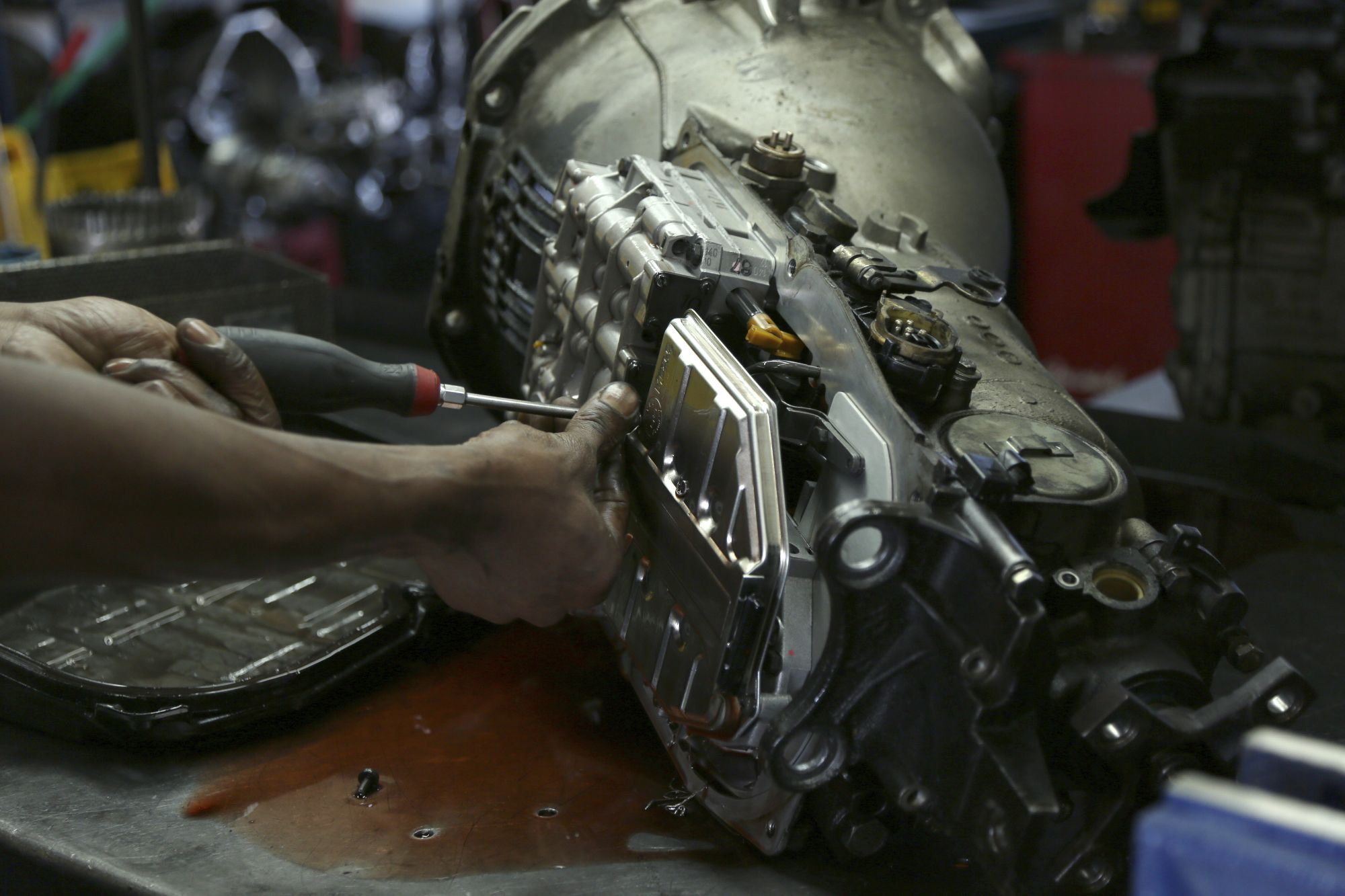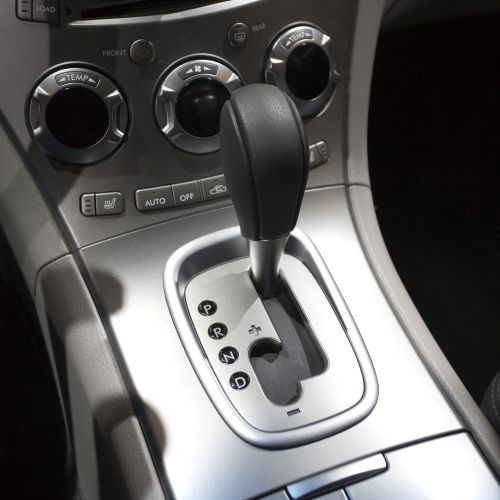
Transmission Repair Services
Transmission Services in Cedar Park
At Lindsey Bimmer Service European Auto Repair, we understand the fear that often accompanies the mention of "transmission repair." Rest assured, there is hope. Whether you drive a manual or automatic vehicle, be it heavy-duty or low-range, your transmission plays a crucial role at the heart of your vehicle's drivetrain.
Responsible for translating the engine's power into forward motion, the transmission is a vital component. When issues arise with this critical part, it can permanently cripple your car. Fortunately, our seasoned experts possess extensive experience working on transmissions of all sizes and types.

Our Transmission Services Include:
Automatic Transmission
Automatic transmissions shift gears seamlessly, optimizing driving performance by adjusting gears based on various factors. These transmissions typically feature four to five forward gear ratios, along with a Reverse, Park, and Neutral gear. Shifting between gears occurs automatically once the car is in Drive, eliminating the need for a clutch pedal or manual gear shifting, as in a Manual Transmission.
Clutch
Your car's clutch serves the vital function of enabling the engine and gearbox to engage and disengage during gear changes. This process allows the engine's output shaft to keep spinning while relieving pressure on the gears, preventing them from shifting improperly.
Cylinder Block
A cylinder block is the powerhouse for the motor vehicle. The solid cast car part houses the cylinders and their components (gaskets, valves, and seals) inside a lubricated and cooled crankcase. Since it is one of the most important parts of your car, the block is designed to be extremely strong and sturdy. Although strong and sturdy, the block is susceptible to failure resulting in a vehicle that won't start. Cracked blocks, porous blocks, core plug, or freeze plug failure are some of the problems facing cylinder blocks. Call 512-296-4631 to talk to the mechanics of Lindsey Bimmer Service European Auto Repair about your cylinder block problems.
Cylinder Head
A cylinder head is the closed end of a cylinder (located in a car's engine block). It sits above the cylinder block, closing the top of the cylinder and forming the combustion chamber. The cylinder head coordinates airflow in and out of the engine. Since the cylinder head's chief function is to seal the cylinders properly, insufficient compression results in the car being difficult to drive. To have your cylinder head checked and repaired, talk to Lindsey Bimmer Service European Auto Repair's cylinder head repair and reconditioning specialists today.
Four-Wheel Drive Transmission
Four-wheel drive (4x4) vehicles boast differential gears, front and rear axles, and a transfer case connected to the transmission. The maintenance of four-wheel drive vehicles necessitates care for the transfer case, front and rear differentials, and transmission fluids. For top-tier service regarding your four-wheel drive transmission, visit us at 2003 North Bell Blvd.
Front-Wheel Drive Transmission
In front-wheel drive vehicles, the engine exclusively drives the front wheels. Power flows through the transmission to the final drive, then splits and propels the two front wheels through the drive axles. Front-wheel drive vehicles position the engine, transmission, and related components at the front of the car. For front-wheel drive transmission repairs, rely on Lindsey Bimmer Service European Auto Repair in Cedar Park, TX.
Manual Transmission
Manual Transmission vehicles involve the use of a clutch pedal and gear shift to manually change gears, determined by the vehicle's speed. Manual transmissions can encompass two to eight gears and are categorized into front-wheel drive and rear-wheel drive configurations. Typically, manual transmissions require less maintenance than automatic ones.
Timing Belt
A timing belt is a part of your car's internal combustion engine. The belt synchronizes the camshaft and the crankshaft rotation so that the engine valves open and close at the correct timings. Also, the belt prevents the piston from striking the valves in an interference engine. Most cars we drive now have timing belts instead of timing chains and gears. Although different manufacturers have their recommended mileage, you need to have your car's timing belt checked regularly. To have it checked by experts, contact Lindsey Bimmer Service European Auto Repair today.
Transfer Cases
A transfer case is a component of four-wheel drive systems in four-wheel drive and all-wheel drive vehicles. It receives power from the transmission and directs it to both front and rear axles. Transfer cases can be chain-driven in most contemporary vehicles. These components connect to the transmission, front and rear axles through drive shafts to ensure maximum control.
Transmission Flush
Although most manufacturers recommend a transmission flush every 30,000 miles or every two years, some symptoms may indicate that you need a transmission flush sooner. Some of the symptoms that indicate that your car needs a transmission flush sooner are: transmission grinding or strange noises, problems shifting gears, slipping gears, surging of the car, and delay in vehicle movement. Flushing the used fluid from the transmission washes away tiny particles of dirt, clutch material, and metal shavings. For all your transmission flush needs, call 512-296-4631 or visit Lindsey Bimmer Service European Auto Repair today - we are transmission experts.
Transmission Maintenance
Any car part manufacturer will tell you that preventive maintenance is critical to the part's lifespan. Like other auto parts, car transmissions aren't built to last forever. However, you can increase the transmission's lifespan by performing regular preventive maintenance. The easiest way to maintain peak performance and fuel economy is to provide regular transmission maintenance for your vehicle. To have your transmission maintained by experts, visit Lindsey Bimmer Service European Auto Repair.
Transmission Repair
When it comes to automatic transmission repair, there are several options: buying a new one, buying a remanufactured one or having yours rebuilt. Each of the above options has its own share of advantages and disadvantages. Of the three options, rebuilt transmissions are the most economical. A rebuilt transmission involves removing the transmission from the car, disassembling it, replacing worn out parts, reassembling it, and then reinstalling it. To have this done by specialists, call 512-296-4631 to talk to the mechanics of Lindsey Bimmer Service European Auto Repair today.
Transmission Replacement
In motor vehicles, the transmission usually refers to the gear box, which uses gears and gear trains to transmit speed and tourque from a rotating power source to another device. You can have your car's transmission replaced with a new, rebuilt, remanufactured, repaired or used transmission. For more information contact Lindsey Bimmer Service European Auto Repair in Cedar Park, TX. Our experienced service technicians can help you make the best decision for your vehicle and your wallet.
Transmission Replacement
In motor vehicles, the term "transmission" usually refers to the gearbox. The transmission employs gears and gear trains to transmit speed and torque from a rotating power source to another device. Vehicle owners can opt for the replacement of their car's transmission with a new, rebuilt, remanufactured, repaired, or used transmission.
Transmission Service, Diagnose and Repair
The transmission interfaces with key vehicle components and must function optimally for your safety. Transmission services include filter replacements and fluid drainage to prevent transmission damage.
Transmission Fluid FAQs
How often do you really need to change transmission fluid?
It's important to change your transmission fluid, but the type of transmission you have affects your ideal changing interval. Most cars on the road today have an automatic transmission. If you drive a car with an automatic transmission you need to change your transmission fluid every 60,000 to 100,000 miles. If your car has a manual transmission, it's recommended that you get the transmission fluid changed every 30,000 to 60,000 miles.
What are signs that you need to change your transmission fluid?
The most obvious sign that it is time to change your transmission fluid is a warning light on the dashboard. Other signs may include the car's engine revving when you accelerate or go around corners, difficulty shifting, a chattering noise when you start driving, a slight burning smell or a puddle under your car. Like always, if you are uncertain about a noise, leak or feeling, we encourage you to bring your vehicle to us here at Lindsey Bimmer Service European Auto Repair in Cedar Park.
Does a car run better after transmission fluid change?
Yes. Changing your car's transmission fluid regularly is a great way to improve fuel efficiency. Your vehicle's transmission will run smoother after changing the fluid, which means your engine will perform better.
What is the average life of a transmission?
Regular fluid changes, filter replacements, and following a proper maintenance schedule are crucial for maximizing transmission life. Neglecting these can significantly shorten its lifespan. Most modern automatic transmissions, with proper maintenance, can last anywhere from 100,000 to 200,000 miles. Manual transmissions typically last longer, often exceeding 250,000 miles with good care.
Which type of transmission lasts the longest?
Opting for a manual transmission means simpler upkeep. They require less frequent servicing than automatics and aren't picky about specific oil types. Cars with stick shifts often enjoy a longer lifespan compared to their automatic siblings of the same model.
To learn more about our Transmission services, call us at 512-296-4631 or request a quote by clicking below:
Request Quote
Discover More About Transmission Repair Services At Lindsey Bimmer Service European Auto Repair in Cedar Park
Undercar Services
4X4 Services

OUR REVIEWS


Brandi I.Thank you for the fast service and top notch work. Scott thank you for the work put in. Josh the communication was great on what needed to be done.
